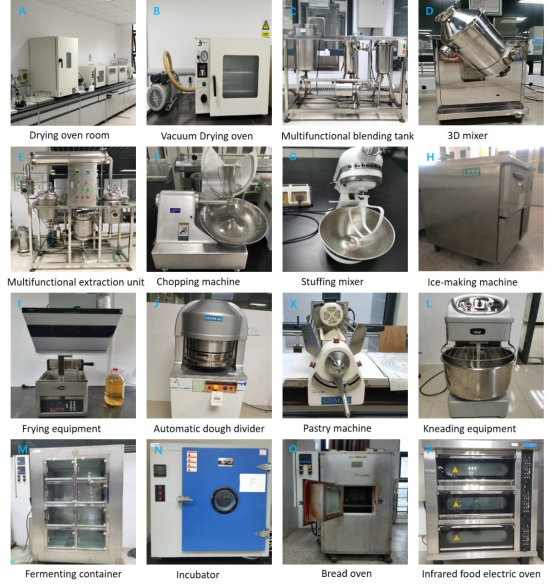The chemistry laboratory section comprises a series of courses-oriented laboratories, including the inorganic chemistry laboratory, organic chemistry laboratory, biochemistry laboratory, food chemistry laboratories, etc. The lab is extended further with an affiliated storage room, preparation room, drying oven room, and scales room.
The laboratory section has a large number of equipment for different chemical experiments, including electronic balances, temperature-controlled water baths, ultra-pure water purifier, pH meters, melting point apparatuses, rotary evaporators, centrifuges, drying ovens, conductivity meters, UV-vis spectrophotometers, fluorescence spectrometer, Kjeldahl nitrogen analyzer, microwave digestion system, liquid chromatograph, gas chromatograph, gas chromatograph- mass spectrometry, etc.
This section facilitates all the food associated chemical labs. It supports the training of qualitative and quantitative analyses of both inorganic and organic substances in foods and other samples for undergraduate students, and allows them to do the experimental work to practice their common chemical experimental skills. By utilizing the facilities, the students run different experiments, such as analyzing the structure and properties of food components (water, carbohydrates, protein, lipids, and other components) and their chemical changes during processing, storage, and utilization, as well as determining the foods associated chemical hazards and their transmission.
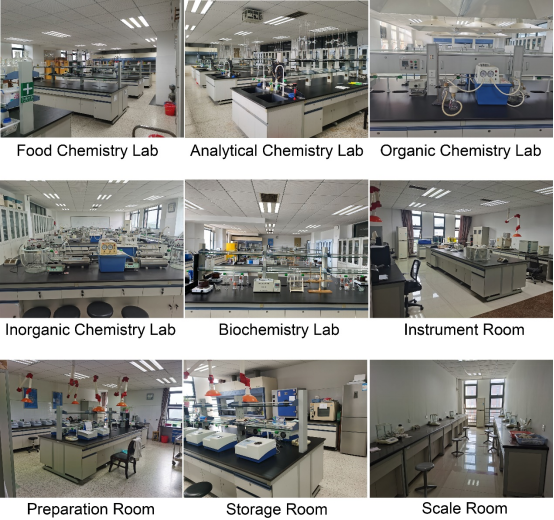
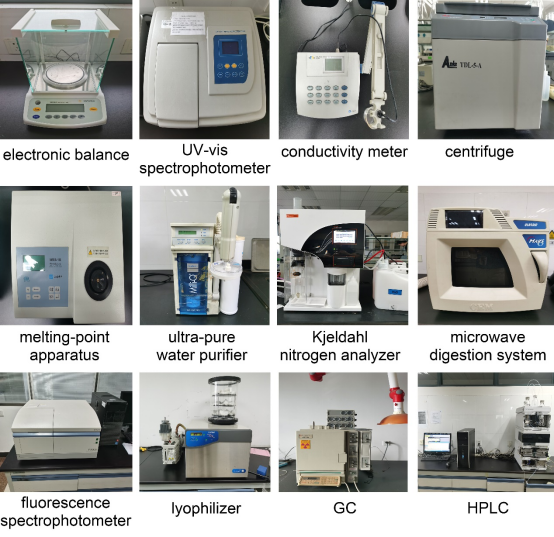
Food Sensory Laboratory
The food sensory evaluation laboratory comprises the organoleptic sensory evaluation laboratory and the instrumental sensory evaluation laboratory. The laboratory supports the curriculums of sensory science, food sensory evaluation, quality assurance, and food law and regulation as well as related experiments.
The organoleptic sensory evaluation laboratory is well-equipped with a ventilation system, an air conditioner, tasting experiment facilities, water supplies, sinks, lighting equipment, a microwave oven, a refrigerator, and other basic laboratory equipment. The preparation room is used to prepare and divide food samples and store food materials for experiments. The instrumental sensory evaluation laboratory, equipped with an electronic nose, an electronic tongue, a color difference meter, a viscosity-meter, and a texture analyzer, aims to provide an excellent platform for food sensory evaluation through instruments and sensory analysis system software, supporting students to learn instrumental sensory evaluation and compare with organoleptic sensory evaluation.
The facilities can motivate students to master the physiological and psychological basis for sensory evaluation and apply experimental designs and statistical methods to sensory studies.
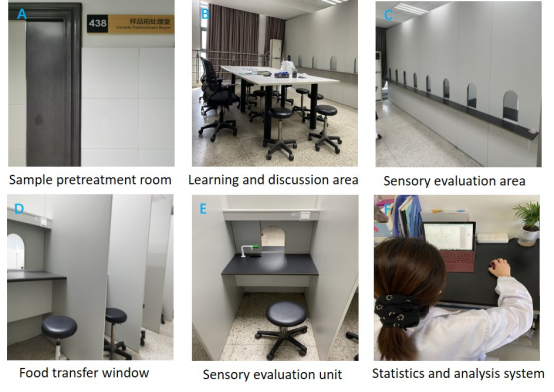
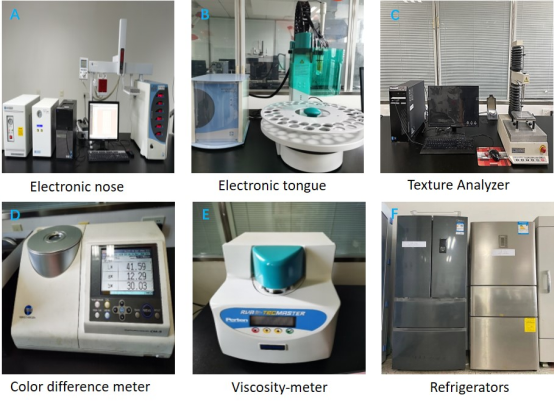
Food Microbiology Laboratory
The microbiology laboratory consists of a food microbiology laboratory and a microbiological testing laboratory. It is extended further with an affiliated preparation room and a disinfection room.
The microbiology laboratory is accompanied by clean benches, biosafety cabinet, water bath, microwave oven, drying ovens, autoclaves, centrifuges, optical microscopes, thermostat (shaking) incubators, refrigerators, fluorescence microscope, anaerobic working station, PCR amplifier, microreader, and other basic teaching and experimental equipment.
This section takes charge of the food microbiology lab and food microbiological test lab. It pays attention to train the undergraduate students with practice activity of basic microbiological skills. By utilizing the facilities, the students gain hands-on experience in isolation, cultivation, and identification of microorganisms in foods, including beneficial, pathogenic, and spoilage microbes. They also use the facilities to investigate the influence of microorganisms on the food system and vice versa, i.e., the influence of physical and chemical factors on their growth, survival, and control.
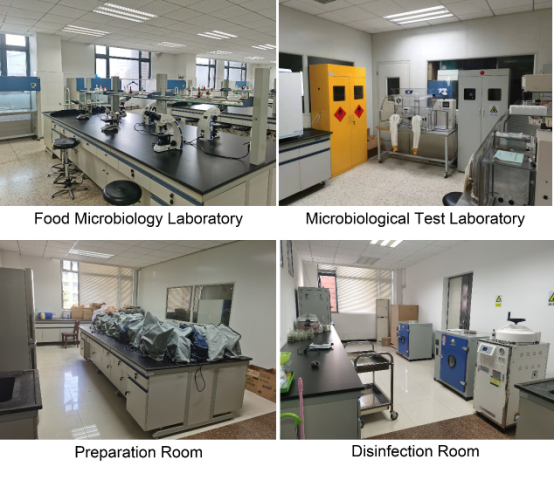
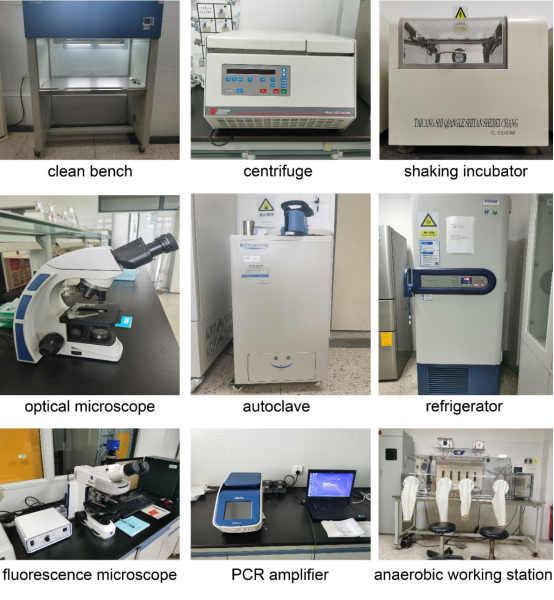
Pilot Plant
The pilot plant is located on the first floor of the food science and engineering building. In addition, there is also a pilot plant of grain storage and preservation on the second floor underground. The pilot plant section is supported by the Grain and Oil Food Engineering Teaching Center of Jiangsu Province.
The pilot plant is equipped with various food drying systems, such as hot air circulating oven, spraying dryer, ceramic infrared-hot air combined drying system, and continuous tunnel microwave drying sterilization line, a complete beverage production line, consisting of extraction and concentration system, plate filtering centrifuge, multi-purpose mixing tank, UHT sterilizer, and sterile packing chamber, and a beer fermentation and product line, including saccharifying tank, filtering tank, boiling pot, whirlpool separating tank, fermentation tank, and clean-in-place purge tank, and grain storage and preservation tanks. It is extended further with other supporting equipment and 3 separate rooms for pretreatment and preparation.
The pilot plant is dedicated to providing practice skill training and lab teachings, such as food engineering and processing, principles of unit operations, food engineering, food processing, food packing, and grain storage and preservation. It also pushes forward undergraduate student research training and academic competition.

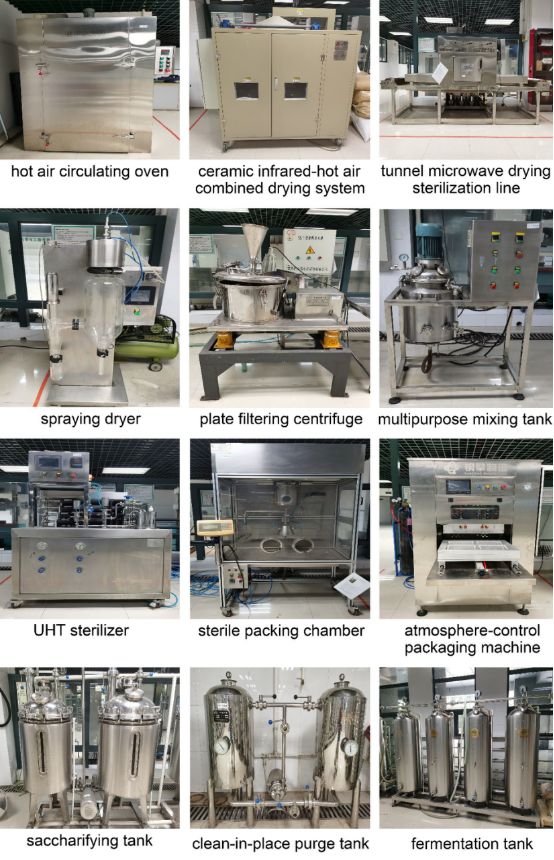
Food processing and engineering laboratory
The food processing and engineering laboratory comprises a general food processing laboratory, a juice and jam processing laboratory, a meat product processing laboratory, and a baking laboratory.
It is equipped with laboratory benches, water bath pots, electronic balances, chopping machines, electric stoves, and other commonly used food processing equipment, and an air conditioner, fume hoods, a water supply, and sinks to meet the required experimental conditions.
These laboratories offer hands-on training to undergraduate students to learn and understand the principles of food processing, the source and variability of raw food materials, and their impact on food processing operations. It is also dedicated to design processing methods for making safe and high-quality foods.

